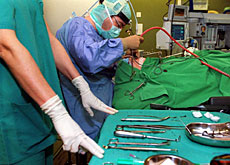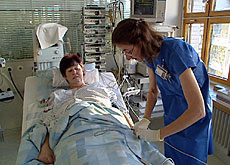Experts warn of rise in hospital superbugs

Cases of the deadly MRSA superbug – which is resistant to many antibiotics – are on the increase in Swiss hospitals.
Health experts say the country is lagging behind in some areas of infection control and are calling for increased measures to fight MRSA and other hospital bugs.
A study, published this month by Swiss-NOSO – a Swiss medical journal dedicated to hospital hygiene – found that the number of MRSA cases had doubled in 2003 compared with the previous year.
The MRSA superbug was found in 45 per cent of hospitals surveyed and infected 176 patients.
“In Switzerland the rate is quite low but now it’s rising,” Dr Hugo Sax, one of the report’s authors, told swissinfo.
“This has happened in other countries around Switzerland, so we are very worried that this might continue here if we don’t fight against it,” he added.
British scientists warned earlier this month that deaths from MRSA could double over the next five years. Around 5,000 patients die each year from infections picked up in British hospitals.
Superbug
MRSA, or methicillin-resistant Staphylococcus Aureus bacteria, is usually carried on the skin or in saliva.
It is only dangerous when it breaks through the skin, which is why it tends to be more prevalent in hospitals which carry out large numbers of operations.
Infection with MRSA can cause a condition called bacteriaemia, which often leads to a lengthy stay in hospital. But it can be deadly for vulnerable patients.
This is why Sax, who works in the infection control unit at Geneva University Hospital, is calling for a nationwide scheme to combat hospital pathogens.
Call for action
The Swiss-NOSO team found out that many infections occurred because hospital staff failed to wash their hands properly. The hospital hygiene watchdog is due to launch a campaign next year to raise awareness of the problem.
Sax says that information campaigns within hospitals on cutting down the risk of infection through correct insertion and use of medical equipment could also help reduce infections by up to 30 per cent.
“We don’t have any legal requirements for infection-control staffing in Switzerland, and until recently we didn’t have a national surveillance scheme for infections,” said Sax.
Swiss-NOSO is working with hospitals and health authorities to set up a national programme for infection prevention and data collection.
“These things exist in Germany, and each hospital is obliged to count the number of infections. Here in Switzerland, there is still some work to be done.”
Infection rate
The study, which looked at 8,500 patients in 57 hospitals across the country, found that 7.7 per cent of patients contracted an infection while in hospital.
But this figure rose to one in four for intensive care patients, and was even higher – at one in three – for intensive care patients in larger hospitals.
“There are four major kinds of infections: infections of the blood, pneumonias, surgical side infections and the most prevalent – urinary tract infections,” explained Sax.
Sax added that infections came mainly from invasive procedures such as operations and devices like urinary or central-vein catheters.
Ageing population
Sax said an ageing population meant that there were more sick elderly patients being operated on, and this was contributing to higher infection rates. Progress in medicine has also led to more invasive procedures.
Infection rates were higher in large hospitals (over 500 beds) at 10.3 per cent, but they declined in smaller hospitals, falling to 4.9 per cent in those with under 200 beds.
Sax explained that this was because more ill and vulnerable people tended to be admitted to larger hospitals.
He said that understanding the extent of the problem and why it occurred was the first step towards the prevention of infection in hospitals.
swissinfo, Isobel Leybold
The Swiss-NOSO study found:
7.7% of hospital patients pick up an infection.
This rises to one in four in intensive care.
Cases of MRSA doubled in 2003.
The number of infections was higher in larger hospitals – 10.3%.

In compliance with the JTI standards
More: SWI swissinfo.ch certified by the Journalism Trust Initiative












You can find an overview of ongoing debates with our journalists here . Please join us!
If you want to start a conversation about a topic raised in this article or want to report factual errors, email us at english@swissinfo.ch.